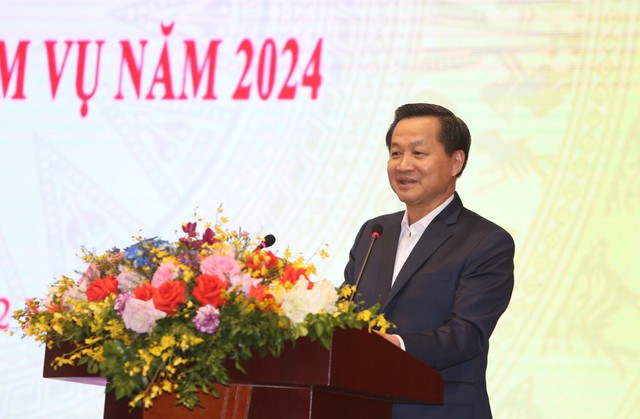Vietnam’s economy likely to achieve 5% GDP growth this year: Deputy PM
The target stays in line with the Government’s earlier projections reported to the National Assembly in October.
Vietnam’s GDP growth is estimated to be around 5% this year, which is considered high compared to countries in the region and around the world.
| Deputy Prime Minister Le Minh Khai at the conference. Source: VGP |
Deputy Prime Minister Le Minh Khai remarked at a year-end conference of the Ministry of Finance on December 27.
According to the Deputy Prime Minister, inflation is under control, with the Consumer Price Index (CPI) expected to increase by approximately 3.5%, within the 4% threshold set by the National Assembly. The trade surplus is forecast to reach a record high of around US$26 billion for the entire year. State budget revenues exceed estimates by 3-4%.
The GDP results align with the Government's earlier projections reported to the National Assembly in October, in which the Government has consistently prioritized promoting growth, maintaining macroeconomic stability, controlling inflation, and ensuring the major balances of the economy.
In 2023, amidst economic difficulties, the Government implemented measures to support businesses and citizens, such as a 2% reduction in value-added tax, a 50% reduction in environmental protection tax on gasoline and diesel, and a 10-50% reduction in 36 fees and charges in the last six months of the year.
The total amount of tax exemptions, deductions, deferrals, fees, and land rent for businesses and citizens, according to the Ministry of Finance's report today, is approximately VND193.4 trillion ($7.95 billion). This includes around VND78.4 trillion ($3.21 billion) in exemptions and reductions and VND115 trillion ($4.72 billion) in deferrals. Specifically, the policy of reducing 36 fees and charges is expected to reduce revenue by about VND700 billion ($28.8 million).
As of December 25, budget revenues reached VND1,690 trillion ($69.5 billion), exceeding estimates by 4.5%. Crude oil revenues increased significantly by 44.6% due to high oil prices. However, budget balance revenue from import and export activities decreased, reaching only 92.1% of the estimate, resulting in a 4.2% decrease in total budget revenue compared to the same period in 2022.
| Overview of the conference. |
Meanwhile, total budget expenditure reached 83.4% of the estimate, about VND1,730 trillion ($70 billion). Development investment expenditures increased by VND144 trillion (5.92 billion), up by about 33% compared to the same period in 2022. However, this spending did not meet the planned targets, reaching only 79.8% of the National Assembly's resolution and 81.9% of the Prime Minister's plan.
The estimated state budget deficit in 2023 is about 4% of GDP, down by VND40.3 trillion ($1.65 billion) compared to the estimate and lower than the Ministry of Finance's previous estimate of 4.42%. This marks a return to growth after the Covid-19 pandemic.
To ensure payment sources and timely repayment of debt principal, as of December 25th, issued government bonds amounted to VND296.7 trillion ($12.2 billion), representing 74.2% of the annual plan. In 2023, the Government completed negotiations and signed 17 agreements for ODA loans and foreign concessional credits with a total value of about $1.87 billion. New loans negotiated and signed since 2022 have higher interest rates than in previous periods, closer to market rates, reflecting the change in donors' lending policies to Vietnam in line with the country's low-middle income status.
The Ministry of Finance also noted that state budget loans were fully repaid on schedule. It is expected that by the end of 2023, public debt will be about 37% of GDP, and government debt about 34% of GDP, lower than the ceiling and warning threshold allowed by the National Assembly.
In 2024, the Government leader instructed the Ministry of Finance to consider amending tax laws to broaden the tax base, including taxing e-commerce, land use, infrastructure, dining services, and entertainment. Khai also tasked the agency with researching and applying appropriate data analysis tools to detect, prevent, and strictly deal with counterfeit and fraudulent invoicing activities.
Additionally, the agency needs to implement policies on taxes, fees, and levies to continue supporting and addressing difficulties faced by businesses and the general public, said Khai.
According to the Deputy Prime Minister, the Ministry of Finance must also review the payment and repayment capabilities of bond-issuing organizations, especially bonds maturing in 2024. The ministry should develop contingency scenarios to deal with them, ensuring the legal rights and interests of investors and relevant entities.














